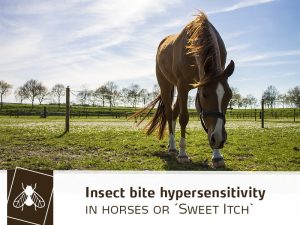
Insect bite hypersensitivity in horses or ´sweet itch`

Spring is finally here and since the temperatures have started to rise we think it is a good idea to go over a few recommendations regarding ´sweet itch`. This disease is caused by an allergy to the bites of flies or midges, most likely by Culicoides species. Approximately 5% of equines in the UK suffer from sweet itch.
Insect bite hypersensitivity can affect any horse, of any age, gender or breed although some horses seem to be more susceptible than others. The condition is usually diagnosed in horses from 4 years onward and often becomes more severe as horses get older. Some horses seem to have a genetic predisposition for this condition.
Affected horses present persistent itching in the areas where they are bitten, usually around their face, ears, neck, belly, shoulders and around the base of the tail. They will rub excessively on objects around them, and kick and bite themselves in an attempt to scratch the affected areas. Over time this leads to hair loss, skin damage, and thickening of the skin which can become infected. These signs are caused by a localised hypersensitivity against the salivary antigens of biting midges (Culicoides) and become worse in hot humid weather. These animals are often restless, irritable and many even lose weight.
If you notice your horse or horses may be suffering with this condition contact your vet. Other allergies can present the same clinical signs and it is necessary to exclude other factors that may also be triggers for this reaction.
The best approach to prevent this disease is a combination of measures that combine reducing exposure to the insects through physical barriers, insect repellents, insecticides and housing horses away from midge habitats. Here are a few tips to prevent your horses from suffering with this condition:
- Stabling during dawn and dusk since this is when midges are most active.
- Using a ceiling fan in the stable can be helpful (midges have poor flying skills).
- Cover windows and stable doors with ultra-fine netting to reduce the number of midges that are able to get in without reducing ventilation and light.
- Using insect repellents and insecticides. These can be sprayed on the nets and on the environment regularly to reduce the number of insects.
- Do your best to turn-out your horse away from wooded areas, static water or slow-moving streams where midges are more likely to breed.
- Fly masks and fly sheets are also very useful to protect your horse against the biting insects.
- Some products can help relieve itching such as topical oils or oatmeal shampoos applied weekly.
If you have any doubts or questions contact your vet.
Would you like to know more about horses? Check our Equine Courses:
Equine courses
Published: 16 May 2016
Read the previous article: Dog Shedding

